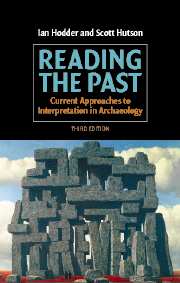Book contents
- Frontmatter
- Contents
- Preface to the first edition
- Preface to the second edition
- Preface to the third edition
- 1 The problem
- 2 Processual and systems approaches
- 3 Structuralist, post-structuralist and semiotic archaeologies
- 4 Marxism and ideology
- 5 Agency and practice
- 6 Embodied archaeology
- 7 Archaeology and history
- 8 Contextual archaeology
- 9 Post-processual archaeology
- 10 Conclusion : archaeology as archaeology
- Bibliography
- Index
Preface to the first edition
Published online by Cambridge University Press: 05 June 2012
- Frontmatter
- Contents
- Preface to the first edition
- Preface to the second edition
- Preface to the third edition
- 1 The problem
- 2 Processual and systems approaches
- 3 Structuralist, post-structuralist and semiotic archaeologies
- 4 Marxism and ideology
- 5 Agency and practice
- 6 Embodied archaeology
- 7 Archaeology and history
- 8 Contextual archaeology
- 9 Post-processual archaeology
- 10 Conclusion : archaeology as archaeology
- Bibliography
- Index
Summary
In some ways I am surprised that a book of this nature, discussing widely varying theoretical approaches to the past, can be written. In an important article, David Clarke (1973) suggested that archaeology was losing its innocence because it was embracing, in the 1960s and 1970s, a rigorous scientific approach, with agreed sets of procedures, models and theories. The age of unreflecting speculation was over.
However, archaeologists have always claimed to be rigorously scientific. Indeed, I argued (Hodder 1981) that archaeology would remain immature as long as it refused to debate and experiment with a wide range of approaches to the past. In grasping positivism, functionalism, systems theory and so on, and setting itself against alternative perspectives, archaeology remained narrow and out-of-date in comparison with related disciplines.
But over recent years, alternatives have emerged, largely from the European scene (Renfrew 1982), and one can now talk of Marxist and structuralist archaeology, as well as of processual, positivist approaches. Certainly such alternatives existed before, on the fringe, but they did not constitute a distinctive approach with a body of practitioners. The older normative and culture-historical schools also continue to thrive today. While many of these developments, and the erosion of the old ‘New Archaeology’ debates, have far to go, archaeology is now beginning to lose its innocence and is gaining maturity by being fully integrated into wider contemporary debates. This book seeks to capture this new spirit of debate and to contribute to it from a particular point of view.
- Type
- Chapter
- Information
- Reading the PastCurrent Approaches to Interpretation in Archaeology, pp. xi - xivPublisher: Cambridge University PressPrint publication year: 2003



